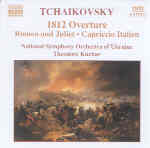In their recent excellent recording of Pictures at an Exhibition and other Mussorgsky goodies, the NSOU’s sometimes rough and ready sonority actually plays to the music’s raw strength. Tchaikovsky is another matter altogether, a composer whose reckless excess of emotion is still expressed in writing of supreme polish and sophistication, and in terms of a sonority squarely rooted in the orchestra’s string section. All of this is quite different from Mussorgsky, even as arranged by Ravel or Rimsky-Korsakov. Still, Kuchar and his players deliver an impressive level of excitement here, and that counts for a lot. The fight music in Romeo and Juliet, for example, has great energy (even if the cymbal player falls a touch behind in the recapitulation), likewise the 1812 Overture (and the canons aren’t bad at all), while the coda of March Slav is thrillingly fast and the quicker sections of Capriccio Italien will set your toes tapping.
But for all that, you’ll miss the necessary weight and intensity of string playing that Tchaikovsky demands in Romeo and Juliet (cellos and basses are particularly weak as the lovers meet their doom). He needs brilliant and powerful rather than thin-toned trumpets (also a liability on the Mussorgsky disc), and oboes with less vinegar in their tone. At the end of 1812, either Kuchar or his engineers decided to keep the bells going during the final cannonade, which really wasn’t such a hot idea. It also would be really nice if Naxos could contrive to give this orchestra consistently first class sound from one release to the next: the tubby bass response and booming timpani don’t help, and the musicians deserve to have their efforts presented in a more flattering light, technically speaking. All that said, I’m keeping this disc for the sheer fun and excitement of hearing this music played at such high voltage, and you’ll have to decide for yourself how much it bothers you that the power flickers a bit too often to give complete satisfaction.
































